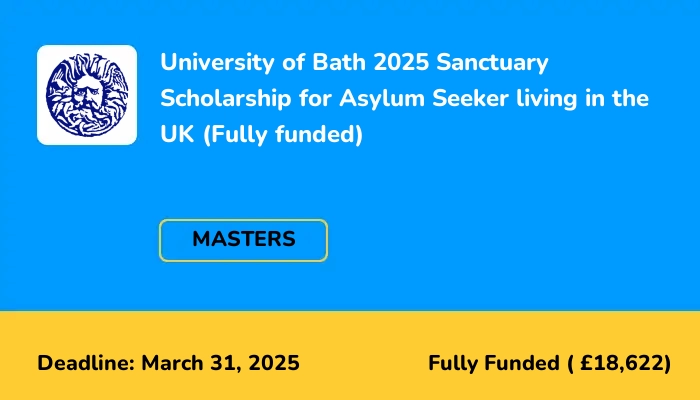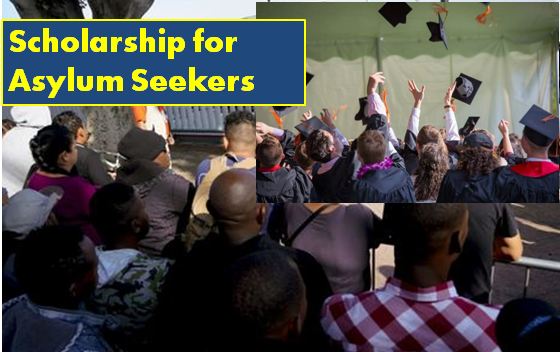A Glimmer of Hope: My Journey to Education as an Asylum Seeker
I remember staring out the window, watching students laugh as they walked by a university campus. The weight of uncertainty, of not knowing what tomorrow held, often felt like a heavy blanket over my dreams. As an asylum seeker, the word "university" often felt like a cruel joke, a distant star I could only admire from afar. How could I, someone with no stable home, no clear legal status, and no money, even dream of higher education?
But then, a whisper, a faint echo in the labyrinth of my worries, began to grow louder: "Scholarships for asylum seekers." It sounded too good to be true. Like finding a hidden spring in a vast desert. Yet, that whisper became my guide, leading me on a journey I never thought possible.
The Mountain of "No’s" and the Seed of Hope
Before I found that whisper, the path to education felt blocked by a mountain of "no’s." No student loans for people like me. No family funds to fall back on. Just a constant struggle to meet basic needs, let alone tuition fees. Every time I thought about continuing my studies, a wave of despair would wash over me. I’d imagine myself forever stuck, unable to use the knowledge and passion I carried inside.
My days were filled with navigating complex legal systems, trying to understand a new language, and adapting to a culture that felt miles away from everything I knew. Education, which had always been a core part of my identity, seemed like an impossible luxury.
Then, one day, while volunteering at a local community center, I overheard someone talking about a program. "They help refugees and asylum seekers go to university," she said, almost casually. My ears perked up. My heart, which had been heavy for so long, felt a tiny flutter. Could it be true? Were there really scholarships for asylum seekers?
My Search for That Golden Ticket
That conversation was the spark. I started my search, often feeling like a detective on a crucial mission. My tools were simple: a borrowed computer, slow internet in the library, and an unshakeable determination.
I quickly learned that finding these scholarships wasn’t always straightforward. There wasn’t one big, obvious signpost. Instead, it was like piecing together a puzzle. Here’s where I looked, and where I encourage anyone in a similar situation to start their own search:
- University Websites: Many universities, especially in countries known for their support of human rights, have dedicated pages or sections for "refugee students" or "asylum seeker applicants." They might offer specific scholarships, tuition waivers, or special support programs. I remember finding a small link tucked away on a university’s admissions page – it felt like striking gold!
- Non-Governmental Organizations (NGOs) and Charities: These organizations are often at the forefront of supporting asylum seekers. Many have educational initiatives or partner with universities to provide financial aid. Groups focused on refugee rights, education, or even specific religious or cultural communities can be great resources.
- Specialized Scholarship Databases: There are online platforms that list scholarships for specific groups. While not all might be exclusively for asylum seekers, some will have filters or categories that can help narrow down the search.
- Local Community Centers and Support Groups: This is where I got my first lead! The people on the ground, who work directly with asylum seekers, often know about local initiatives or hidden gems that aren’t widely advertised. Don’t be afraid to ask around.
- Government Programs (Less Common, But Worth Checking): In some countries, there might be limited government-funded programs or grants, especially for specific fields of study or regions. It’s less common for asylum seekers compared to citizens, but it’s always worth a quick check on official education ministry websites.
My advice: be persistent. Send emails. Make phone calls. Visit offices if you can. Every "no" brings you closer to a "yes."
What They Looked For: More Than Just Grades
As I started to gather information, I realized that these scholarships weren’t just about having good grades (though those definitely helped!). They were looking for something more profound. They wanted to see the person behind the application.
Here are some of the common requirements and what I learned about making my application stand out:
- Proof of Asylum Seeker Status: This is obvious but crucial. You’ll need documents from immigration authorities to confirm your status.
- Academic Records: If you have them, provide transcripts, diplomas, or any proof of your previous education. Even if they’re incomplete or not officially recognized, submit what you have and explain your situation clearly. My own records were fragmented, but I explained the circumstances of my displacement.
- Language Proficiency: Most university courses are taught in the local language or English. You’ll likely need to show you can understand and communicate effectively. Many scholarship programs offer language courses or accept proof of enrollment in one.
- A Powerful Personal Statement/Motivation Letter: This was my chance to tell my story. Not just a list of achievements, but the journey that brought me here. I wrote about my passion for learning, the challenges I faced, and how education would not only benefit me but also allow me to contribute positively to my new community. This is where your unique experience becomes your strength.
- Letters of Recommendation: If possible, get letters from previous teachers, employers, or community leaders who know you well and can speak to your character, potential, and resilience.
- Proof of Financial Need: Most scholarships for asylum seekers are needs-based. You’ll need to demonstrate that you genuinely cannot afford tuition and living expenses without support.
My Application: Telling My Story
The application process was daunting. There were forms, essays, and endless checking of details. But I approached it with a new sense of purpose. This wasn’t just about getting money; it was about reclaiming my future.
When writing my personal statement, I focused on authenticity. I didn’t try to sound like someone I wasn’t. I shared my fears, my hopes, and my unwavering belief in the power of education. I wrote about how my experiences, though difficult, had given me a unique perspective and a deep desire to learn and make a difference. I emphasized my resilience, my ability to adapt, and my hunger for knowledge.
I also sought help. I asked a trusted mentor at the community center to read my essay. Her feedback was invaluable, helping me to clarify my thoughts and make my story even stronger. Don’t be afraid to ask for help; there are people who want to see you succeed.
Beyond the Money: A New Beginning
When the acceptance letter arrived, I couldn’t believe it. It wasn’t just an offer of financial aid; it was an invitation. An invitation to belong, to learn, and to grow. It wasn’t just tuition fees; it was a key to a new world.
The scholarship did more than just cover my university costs. It opened doors to a support network. I met other students who understood parts of my journey. I found mentors who guided me. I felt a sense of purpose I hadn’t felt in years.
Education for asylum seekers isn’t just about individual advancement; it’s about building stronger communities. It’s about recognizing the incredible potential and resilience that people carry, regardless of their past circumstances. It’s about giving back dignity and opportunity.
Your Journey, Your Story
If you’re an asylum seeker dreaming of higher education, please know this: your dream is valid, and resources do exist. The path might be challenging, filled with paperwork and moments of doubt, but it is a path worth walking.
Your journey is unique, your story powerful. Don’t let your current status define your future potential. Seek out those whispers of hope, be persistent in your search, and tell your story with conviction. There are people and institutions out there ready to support you, ready to help you turn that distant star into a guiding light.
My own journey is still unfolding, but thanks to that glimmer of hope and the scholarships I found, I am now a student, learning, growing, and contributing. And if I can do it, so can you. The world needs your voice, your knowledge, and your unique perspective. Go find your scholarship; go write your next chapter.



